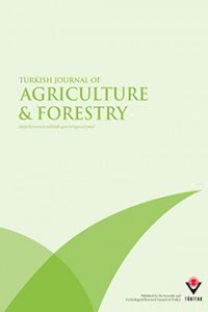In Vitro Studies on Some Natural Beverages as Botanical Pesticides against Erwinia amylovora and Curtobacterium flaccumfaciensis subsp. poinsettiae
Several tannin-rich beverages were tested for their antibacterial activity against 2 important phytopathogenic bacteria, Erwinia amylovora and Curtobacterium flacumfaciensis subsp. poinsettiae. Black tea (9.5, 19 and 38 g l-1), green tea (9.5, 19 and 38 g l-1) and tannic acid (0.2, 0.4 and 0.8 g l-1) inhibited the growth of E. amylovora and C. f. subsp. poinsettiae. Coffee (8.75, 17.5 and 35 g l-1) and cocoa (8.75, 17.5 and 35 g l-1) did not display any inhibitory effect on the growth of bacterial cultures. The numbers of colony forming units (CFUs) of E. amylovora in the presence of black tea, and of C. f. subsp. poinsettiae in the presence of tannic acid were lower than their control counterparts. Over prolonged incubation the inhibitory effect of extracts on the number of CFUs was diminished. The results suggest that tea extract might be a safe agricultural chemical against some important plant diseases, play a vital role in meeting the demand for organically produced plants and alleviate some environmental problems associated with the use of synthetic chemicals.
Anahtar Kelimeler:
biological control, botanical pesticide, environmental pollution, health risk, organic farming
In Vitro Studies on Some Natural Beverages as Botanical Pesticides against Erwinia amylovora and Curtobacterium flaccumfaciensis subsp. poinsettiae
Several tannin-rich beverages were tested for their antibacterial activity against 2 important phytopathogenic bacteria, Erwinia amylovora and Curtobacterium flacumfaciensis subsp. poinsettiae. Black tea (9.5, 19 and 38 g l-1), green tea (9.5, 19 and 38 g l-1) and tannic acid (0.2, 0.4 and 0.8 g l-1) inhibited the growth of E. amylovora and C. f. subsp. poinsettiae. Coffee (8.75, 17.5 and 35 g l-1) and cocoa (8.75, 17.5 and 35 g l-1) did not display any inhibitory effect on the growth of bacterial cultures. The numbers of colony forming units (CFUs) of E. amylovora in the presence of black tea, and of C. f. subsp. poinsettiae in the presence of tannic acid were lower than their control counterparts. Over prolonged incubation the inhibitory effect of extracts on the number of CFUs was diminished. The results suggest that tea extract might be a safe agricultural chemical against some important plant diseases, play a vital role in meeting the demand for organically produced plants and alleviate some environmental problems associated with the use of synthetic chemicals.
Keywords:
biological control, botanical pesticide, environmental pollution, health risk, organic farming,
- ISSN: 1300-011X
- Yayın Aralığı: Yılda 6 Sayı
- Yayıncı: TÜBİTAK
Sayıdaki Diğer Makaleler
Ilgarini Mağarası’nda (Pınarbaşı-Kastamonu) Arkeobotanik ve Dendroarkeolojik İncelemeler
Mustafa TAN, Yunus SERİN, H. İbrahim ERKOVAN
Evaluation of the Antioxidant and Antimicrobial Activities of Clary Sage (Salvia sclarea L.)
Archaeobotanical and dendroarchaeological studies in İlgarini Cave (Pınarbaşı, Kastamonu, Turkey)
Ünal AKKEMİK, Burhan AYTUĞ, Sercay GÜZEL
Determination of Wetland Vegetation Height with LIDAR
Levent GENÇ*, Bon DEWITT*, Scot SMITH*
Destructive Effects of Classical Viscosimeters on the Microstructure of Yoghurt Gel
Effect of Different Control Methods on Weeds, Yield Components and Nodulation in the Spring Lentil
Mustafa ERKAN*, Mustafa PEKMEZCİ, Hamide GÜBBÜK, İşılay KARAŞAHİN
